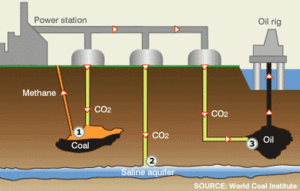Energy futuresObama panel recommends active U.S. backing for clean coal
A panel appointed by President Obama calls for an active U.S. government role in promoting carbon capture and storage, or CCS, a largely undeveloped technology that aims to prevent carbon emissions blamed for global warming from entering the atmosphere; panel recommends government’s consideration of accepting liability over carbon storage sites for thousands of years to come

Carbon storage options // Source: bbc.co.uk
A task force to President Barack Obama called last Thursday for a strong government role to promote clean coal, potentially accepting liability over carbon storage sites for thousands of years to come.
Obama had asked the panel to recommend how to promote carbon capture and storage, or CCS, a largely undeveloped technology that aims to prevent carbon emissions blamed for global warming from entering the atmosphere. Some environmentalists dismiss CCS as untested and costly, but the United States along with several other nations such as China and Australia see it as crucial as it would allow continued use of coal, which is highly polluting.
AFP reports that the task force, which included fourteen federal agencies and departments as well as stakeholders, called for government financial and technical support to meet Obama’s goal of creating up to ten CCS demonstration projects by 2016. “A diversified energy portfolio, which includes coal, is important for a strong 21st century American economy,” Nancy Sutley, chair of the White House Council on Environmental Quality, said in a statement. “These recommendations move us toward bringing safe and deployable CCS technologies to the marketplace to help us meet the goal of reducing harmful carbon emissions while continuing to use this energy source,” she said.
Along with the high costs of CCS projects, the report said a potential hang-up was how to ensure liability for storage areas — geological formations where carbon can be kept for hundreds or even thousands of years. Private businesses, which must routinely reflect risks on balance sheets, “are uncomfortable undertaking these long-term risks,” the report said.
It recommended work on a legal framework, including potentially “transfer of liability to the federal government after site closure,” with some caveats.
The task force also called for a standing “federal agency roundtable” to push forward CCS.
The report comes even though the U.S. Congress put on hold legislation to set up the first nationwide plan mandating cuts in carbon emissions. In hopes of securing support of lawmakers from coal states, legislation — including a bill approved last year in the House of Representatives — has enthusiastically backed CCS.
